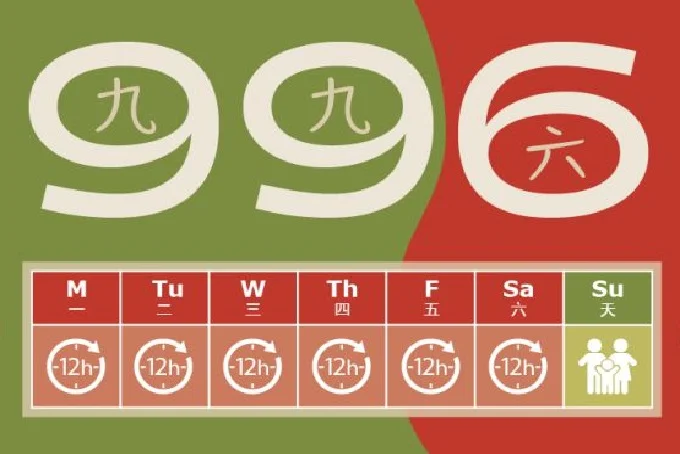Jack Ma 996: what is 996 work culture and why was it illegal in China?

China is a nation in which, against all odds, both capitalism and communism have managed to coexist. On the other hand, China is now one of the world’s leaders in terms of the development of both the economy and technology and it’s all because of how large the job market is.
Since innovation is necessary to achieve success in such a competitive atmosphere, the Chinese sometimes “burn” while at work, and businesses are the only ones to blame for such workaholism. What is the “996 work culture” worth: a horrific style of operation that ultimately results in passing out, tiredness, and death.
The one-of-a-kind characteristics of China’s traditional workplace culture
There is a distinct mentality about one’s place of employment in a number of Asian governments, including China. Working here is considered more of a responsibility and an act of service than just a means to increase one’s income. To get such a perspective of the globe, many workers wind up spending more time at work than they would in the same country in Europe or the United States.
If it were a voluntary effort on the part of the employees, there wouldn’t be any problems at all. In point of fact, they are coercive actions. The labor market in China is always being refreshed, which results in a high number of applicants for each available position. And naturally, the company will go with an applicant who is willing to work almost nonstop if given a choice. Because of this, the 996 work culture eventually became the industry standard.
What exactly is 996 work culture?
A person who follows the 996 work culture schedule will have their shifts run from 9 a.m. to 9 p.m., 6 days a week. Most importantly, a timetable like this is considered to be “preferred” in IT businesses. For instance, Jack Ma, CEO of Alibaba, has said publicly that he saw the 996 work culture as a godsend. People interested in working 8 hours a day are simply not needed in the organization. According to Jack Ma, it is impossible to attain success without making extra efforts and working outside of regular school hours.

In point of fact, it is not at all hard to fathom how such a labor ethic, and later the idea of 996, may have originated in China. In the early years of the new millennium, China saw a proliferation of new businesses centered on information technology. The battle to secure a position in the market had begun, and the level of competition was unreasonable. In order for businesses to maintain their viability, they need workers who, much like robots, are willing to put in long hours at the office, and the benefits come quickly.
The year 2016 saw the debut of the phrase “996.” The advertising website 58.com was the first to implement such a system for the benefit of its workforce. This way of thinking has been the standard for many years. Michael Moritz, a millionaire from the United States, was of the opinion that such a structure gave China an edge over its competitors. Who in their right mind in the United States or Europe would consent to such an obviously oppressive schedule? However, the Chinese were successful.
Firms like Xiaomi, Huawei, and Alibaba are prime examples of global powerhouses that have thrived due to the 996 work culture and the lack of overtime compensation. These factors were important in the companies’ rise to the top.
System hazard to life
There are a lot of individuals who, particularly young people, like to brag about their endurance, but the truth is that everybody needs to be refreshed every once in a while. That’s why we save things like this for the weekends and holidays. When people work 12 hours per day, six days per week, their bodies are not getting the rest they need, which may lead to various health issues.
A working culture like this one causes the body to get exhausted much too rapidly, causing it to become worn out and eventually quit up. Strokes and heart attacks are the kinds of illnesses about which workers most often express concern.
Workers in Japan, another nation in Asia, are confronted with comparable challenges. In addition to this, they like working at a breakneck speed. Kiroshi is the Japanese term for “death from overwork,” and the Japanese have even created a name for it. It is not unusual for office employees in Japan to get so worn out from working overtime that they end their lives by taking their own life.
Contravention of the law as well as the public interest
People have been known to pass out while using functional restrooms, to remark that they went days without seeing daylight, and to be unable to do their jobs under such circumstances simply.
2019 marked the beginning of their criticism of the system. A group of programmers has sent a petition to GitHub to demand those start-up companies accused of mistreating their employees be prohibited from accessing the open source code that GitHub provides.
Those members of the Millennial generation who were born in the 1990s felt the most discontent with the current condition of things. These were spoilt and self-centered individuals who were aware of their own values. They were confused as to why they were required to spend every waking moment of their life in labor and service.
Although the majority were still reluctant to speak out due to the fact that everyone needed a job and money, a tipping point was soon reached.
The public’s attention has been drawn to a series of mishaps that have occurred at firms in China. It all began in 2021 with the e-commerce firm Pinduoduo, when two workers died just a few weeks after one other in quick succession. And although it’s possible that it was just a coincidence, the whole thing seemed just too odd. One of them passed out on their way home after yet another tiring day of work, while the other ended their own lives by taking their own lives. It was not quite apparent whether or not this was really connected to the processing, but these fatalities acted as a catalyst, and after that, the Chinese began talking about how they were not content with the 996 work culture.
As the controversy gained steam, the government of China began to bring people’s attention to the developing issue. There have been rumors that new regulations are going to be drafted to deal with disagreements in the workplace. Concurrently, a social movement that was known as Tang Ping (which literally translates to “to lay on level ground”) emerged throughout the nation. The activists did not seem to be workaholics, as shown by the fact that they advocated for a less stressful and more relaxed way of life.
Employers lost the battle against overworked workers
This matter was resolved by China’s highest court, the Supreme Court. At the conclusion of the month of August 2021, there were rumors that using the 996 working culture for work was against the law.
Following the discovery of these documents, it became abundantly evident that one of the enterprises had reached an understanding with its workforce to forgo the payment of overtime wages. After that, it came to light that an employee of one of the companies had passed out at work while using the toilet at 5:30 in the morning, and later passed away from heart failure. The incident was recorded. The workplace was found to be the contributing factor in the decedent’s passing, and the court ordered a payment of $62,000 to be made to the victim’s family.
There were a total of ten decisions handed down. They were elaborated upon in a statement that was issued jointly by the Supreme Court of China and the Ministry of Labor. They included either labor conflicts or work that was required to be done over time. The authorities consistently took the position that they were on the side of the workers throughout all of these judgments.




